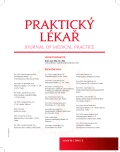Research of opinions and attitudes of Czech citizens to general practitioners
Authors:
S. Býma 1; B. Seifert 2; N. Král 2
Authors‘ workplace:
Lékařská fakulta Univerzity Karlovy v Hradci Králové
Ústav sociálního lékařství
Přednosta: doc. MUDr. Svatopluk Býma, CSc.
1; 1. lékařská fakulta Univerzity Karlovy v Praze Ústav všeobecného lékařství
Přednosta: doc. MUDr. Bohumil Seifert, PhD.
2
Published in:
Prakt. Lék. 2016; 96(5): 217-222
Category:
Of different specialties
Overview
The Director-General of the WHO M. Chan presents WHO’s opinion that the health system, the backbone of which is primary care and general practitioners (GP) form its basis, brings the best results in health care with the lowest costs and maximum clients’ satisfaction.
A representative sociological research dealing with the Czech Republic (CR) citizens’ attitude to general practitioners was carried out in 2015. In absolute majority of cases (94.1%), the CR citizens express satisfaction with their GPs’ care and the time, which they devote to them during their appointment. Moreover, the absolute majority of cases of the CR citizens (95.9%) were satisfied with nurse´s work in the GP’s surgery. The citizens appreciate that GP’s communication with them is polite and effective focusing directly to the core of the problem. In terms of GP’s experience with differentiation between psychological and physical origin of health complaints, nearly 10% of the citizens feel problems, which can be related to psychosomatic character of these complaints. Great deal of citizens would appreciate if they could make an appointment to see their GP on a particular day and hour. On the contrary, one quarter of the respondents refuses this option and the system of appointments does not suit them. The survey results point out that introducing the gate-keeping system would be met with incomprehension in 51.3% of CR citizens. There is not a significant difference between average monthly costs on medicaments, which are bought over-the-counter by the citizens and a price of medicaments prescribed by GPs. The citizens support an idea that their GP could perform some lab tests (POCT) just in the surgery. Only 4.5% of citizens were against this option. A similar support has a possibility that the GPs could dispense some medicaments in their surgery. Only 7.5% of respondents declined this option. The gained findings will be used in the frame of GPs’ lifelong education and development of primary care in the Czech Republic.
Keywords:
general practitioner – attitudes of people towards GPs – pharmacotherapy – gatekeeping
Sources
1. Býma S, Seifert B, Šmatlák V, Štolfa J. Koncepce oboru všeobecné praktické lékařství. Prakt. Lék. 2014; 94(1): 3–9.
2. Chan M. The rising importance of family medicine [online]. Dostupné z: http://www.who.int/dg/speeches/2013/family_medicine_20130626/en/ [cit. 2016-06-07].
3. Seifert B, Beneš V, Býma S, a kol. Všeobecné praktické lékařství. 2. vydání. Praha: Galén 2013.
4. Seifert B, Král N, Býma S. Pozitivní postoje občanů k všeobecným praktickým lékařům. Prakt. Lék. 2014; 94(5): 235–238.
5. Český statistický úřad. Věkové složení obyvatelstva České republiky v roce 2014. Stav k 31. 12. 2014. Praha, Český statistický úřad 2015.
Labels
General practitioner for children and adolescents General practitioner for adultsArticle was published in
General Practitioner

2016 Issue 5
- Memantine Eases Daily Life for Patients and Caregivers
- Memantine in Dementia Therapy – Current Findings and Possible Future Applications
- Possibilities of Using Metamizole in the Treatment of Acute Primary Headaches
- Hope Awakens with Early Diagnosis of Parkinson's Disease Based on Skin Odor
- Spasmolytic Effect of Metamizole
-
All articles in this issue
- Intervention of occupational therapist in adult patients with neurogenic dysphagia
- Research of opinions and attitudes of Czech citizens to general practitioners
- Patients with Alzheimer’s dementia in the context of family care
- Assessment of invalidity of diabetic patients
- Diabetic cancer patients in palliative hospice care
- General Practitioner
- Journal archive
- Current issue
- About the journal
Most read in this issue
- Assessment of invalidity of diabetic patients
- Intervention of occupational therapist in adult patients with neurogenic dysphagia
- Patients with Alzheimer’s dementia in the context of family care
- Diabetic cancer patients in palliative hospice care
